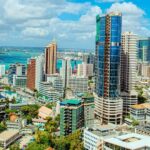Dear Editor,
THE ever-increasing cost of fuel has become a burden too heavy for the ordinary citizen to bear.
What used to be a routine visit to the petrol station has now turned into a stressful ordeal for most families and small businesses.
As fuel prices continue to climb, so too does the cost of transportation, food, electricity, and virtually every other basic necessity.
It is time for the government to intervene and provide a much-needed subsidy to bring relief for the people.
Fuel is not a luxury – it’s a lifeline. It powers the buses that take children to school, the trucks that deliver our food, and the generators that keep the lights on when the grid fails.
When fuel becomes unaffordable, it triggers a chain reaction that drives inflation, weakens the buying power, and deepens poverty.
The hardest hit are not the elite who can absorb the shock, but the struggling families who must choose between commuting to work and putting food on the table.
While we understand that global market forces may be influencing fuel prices, the government cannot sit idly by while its citizens are being economically strangled.
Other nations have responded by cushioning their people through subsidies, strategic fuel reserves, or temporary tax reductions. Why can’t we do the same?
A responsible government must prioritise the welfare of its people, especially in tough times. Fuel subsidies may not be a permanent solution, but they can provide immediate relief while longer-term alternatives such as public transport upgrades, renewable energy, and local refining capacity are developed.
We urge policymakers to stop shifting blame and start taking action.
If the government truly wants to reduce the cost of living, this is the place to start. Subsidising fuel is not just an economic decision – it is a moral one. Let us not wait until more children drop out of school, more businesses shut down, or more citizens fall below the poverty line before we act.
We call on the government to do the right thing: subsidise fuel, reduce the pressure on the people, and protect the nation’s fragile economic stability.
JOHNSTON CHIMBA.










